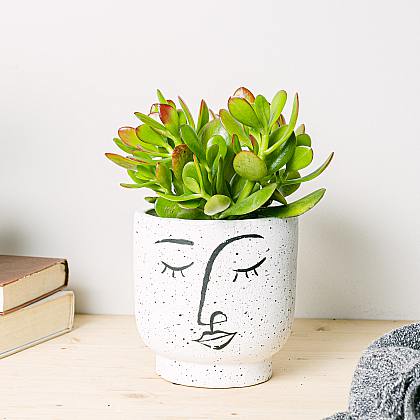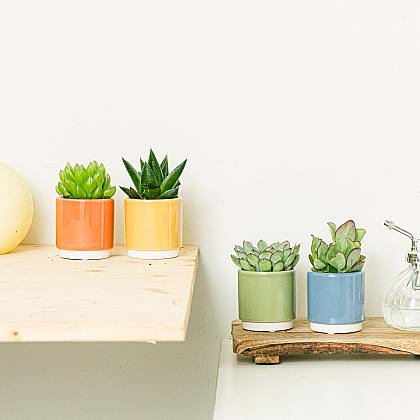Terrariums: an educational and original option to give as a gift on a children's birthday
Children's birthdays are a special occasion that deserves an original and educational gift. In this sense, terrariums are presented as a creative and personalized alternative that not only encourages children's imagination and creativity, but also teaches them important values such as responsibility and care for the environment
Children's birthdays are a special occasion that deserves an original and educational gift. In this sense, terrariums are presented as a creative and personalized alternative that not only encourages children's imagination and creativity, but also teaches them important values such as responsibility and care for the environment. But what are terrariums? In this article, we'll explain everything you need to know about them, from their educational importance to the materials and steps to create one, as well as ideas for decorating and customizing it. Read on to find out why a terrarium can be the perfect gift for any child on their birthday!
What are terrariums?
Terrariums are small miniature ecosystems that are created inside a glass or plastic container. These contain living plants, moss, soil, and other natural elements that allow you to recreate an environment similar to nature. Terrariums can be open or closed, depending on the needs of the plants you want to grow.
These charming miniature gardens are not only aesthetically appealing, but also offer a unique opportunity for children to learn about nature and the life cycle of plants. By observing how plants grow and develop inside the terrarium, children can learn about the importance of water, sunlight, and proper plant care. In addition, terrariums encourage responsibility and respect for the environment, as children must take care of the irrigation and maintenance of their own ecosystems.
Terrariums are also an original and personalized option to give as a gift for children's birthdays. You can create a unique terrarium using different types of plants, decorations, and containers. This allows the gift to be tailored to the child's tastes and preferences, making it a truly special gift.
In short, terrariums are small miniature gardens that offer an educational and creative experience for children. Through them, the little ones can learn about nature, develop skills of responsibility and care, and let their imagination run wild by creating their own green world.
The Educational Importance of Terrariums for Children
The Educational Importance of Terrariums for Children
Terrariums are an invaluable educational tool for teaching children about nature and the environment. Through creating and caring for a terrarium, children can learn about the life cycle of plants, the importance of sunlight and water, as well as develop responsibility and care skills. By actively participating in the creation of a terrarium, children can observe how plants grow and develop, allowing them to better understand the concepts of germination, growth, and reproduction.
In addition, terrariums offer a unique opportunity for children to explore and learn about different types of plants and ecosystems. They can investigate what kind of plants are suitable for a closed or open terrarium, what needs they have in terms of light and humidity, and how they interact with other elements in the environment. This fosters their curiosity and promotes active learning as they discover new plant species and understand how they adapt to the environment.
Terrariums also help children develop fine motor skills, as they require handling small, delicate tools, such as tweezers or brushes for planting and decorating. In addition, they promote creativity and imagination, as children can personalize their terrarium with decorative elements such as stones, figurines or miniatures.
In short, terrariums are a great way to engage children in hands-on learning about nature and the environment. Through this activity, they acquire basic scientific knowledge, develop fine motor skills, and cultivate values such as responsibility and care for the natural environment.
An Original and Personalized Gift Option
If you are looking for an original and personalized gift option for a children's birthday, terrariums can be an excellent alternative. These small miniature gardens allow you to create a world of your own in a small space, making them a unique and very special option. In addition, the possibility of personalizing them with different decorative elements, such as stones, shells or figurines, allows them to be adapted to the taste and style of the child who receives them as a gift.
Creating a terrarium is a fun and creative activity that can involve the child in the design and construction process, increasing the sentimental value of the gift. In addition, this type of gift encourages children's imagination and creativity, as it allows them to create a world of their own from their own vision and personal taste.
In short, terrariums are an original and personalized option to give as a gift for children's birthdays that will not only surprise the little ones, but will also give them the opportunity to develop manual and artistic skills, as well as responsibility in caring for plants and the environment.
Materials and Steps to Create a Terrarium
To create a terrarium, you need a few basic materials. First of all, it is important to choose a transparent container that allows you to see the inside of the terrarium. It can be made of glass or plastic, as long as it has a lid to prevent moisture from escaping. In addition, soil will be needed for plants, small stones, moss, and small plants that are adapted to the terrarium conditions.
The first step in creating a terrarium is to place a layer of small stones at the bottom of the container to allow water to drain. A layer of activated charcoal is then placed to prevent the build-up of bacteria and bad odours. A layer of plant soil is then added and a hole is made in it to place the plants.
It's important to choose small plants that won't grow too tall and are adapted to terrarium conditions. Some options are ferns, succulents, or cacti. Once the plants are in place, the terrarium can be decorated with moss, decorative stones, or small figurines.
Finally, it is important to water the terrarium carefully and keep it out of direct sunlight. Terrariums are closed ecosystems that require little water and maintenance, but it is important to be aware of possible changes in the conditions of the terrarium. Creating a terrarium is a creative and educational activity that allows children to learn about nature and the responsibility of caring for a living being.
Ideas for Decorating and Personalizing the Terrarium
One of the most fun and creative parts of creating a terrarium is decorating and customizing it. The options are endless and will depend on each child's style and preferences. A popular idea is to add small animal figures, such as dinosaurs or unicorns, to add a magical touch to the terrarium. Stones, shells, and other natural objects can also be used to recreate a landscape. To add color to the terrarium, succulent plants of different shades and textures can be included. In addition, you can play with the height of the plants to create an effect of depth in the terrarium. Another option is to use artificial elements such as LED lights or small fountains to create a unique atmosphere in the terrarium. Kids can also add custom details, such as a small sign with their name on it or a photo of their pet. You can even make a themed terrarium, for example, inspired by the jungle or outer space. The important thing is to let your imagination run wild and create a terrarium that is unique and special for the child who receives it as a gift. By involving children in the process of decorating and customizing the terrarium, they are encouraged to be creative and imaginative while learning about nature and the responsibility of caring for a living being.
Basic Terrarium Care: Teaching Responsibility to Children
Not only are terrariums a creative and educational option to give as gifts for children's birthdays, but they can also teach children about responsibility and care for plants and animals. Basic terrarium care is essential to maintain a healthy environment for the creatures that inhabit it. It is important to teach children the importance of properly feeding the animals, providing them with fresh water, and regularly cleaning the terrarium to prevent the accumulation of dirt and bacteria. In addition, it is necessary to explain to them the importance of controlling the temperature and humidity inside the terrarium to ensure the well-being of plants and animals. By involving children in these caregiving tasks, they are taught about responsibility and their sense of commitment to the environment is fostered. They are also given the opportunity to learn about the life cycle of plants and animals, as well as their interdependence in a closed ecosystem. Terrarium care is not only a fun way to teach children about responsibility, but it also allows them to develop practical skills, such as observation, patience, and problem-solving. In short, terrariums offer a valuable lesson on caring for the natural environment and help to form children who are more aware and respectful of nature.
A Gift That Encourages Creativity and Imagination
A Gift That Encourages Creativity and Imagination
Terrariums are a gift that not only entertains children, but also encourages their creativity and imagination. By creating their own miniature world inside a glass container, children have the opportunity to design and customize their terrarium according to their own tastes and interests. They can choose the plants, stones, decorative elements and even the characters they want to include in their small ecosystem. This freedom to make decisions and express their creativity gives them a sense of ownership over their creation, which in turn stimulates their imagination.
In addition, the care of the terrarium also involves responsibility on the part of the children. They learn the importance of providing the right conditions for plant growth, such as the amount of light and water needed. They also learn to be aware of natural cycles as they observe how plants grow and develop over time. These types of experiences teach them to be responsible and to value the work that goes into maintaining a living environment.
Creativity and imagination are fundamental skills in child development. Fostering these skills from an early age contributes to the holistic development of children, as it allows them to explore new ideas, solve problems, and think outside the box. Terrariums offer a unique opportunity to cultivate these skills while children have fun creating their own miniature world. Undoubtedly, giving a terrarium as a gift is an original and educational option that stimulates the creativity and imagination of the little ones.
Terrariums are a creative and educational option to give as gifts for children's birthdays. They are a fun way to teach children about nature, encourage their imagination and develop their responsibility. In addition, they are customizable and can be decorated according to the tastes of each child. Through the creation and care of a terrarium, children learn about different materials and plants, as well as gain basic gardening skills. This gift not only provides them with entertainment, but also teaches them to take care of another living being, instilling in them values of responsibility and respect for nature. Terrariums are an original and meaningful option that stimulates creativity and learning in children. What other creative and educational alternatives are there to give as gifts for children's birthdays?


